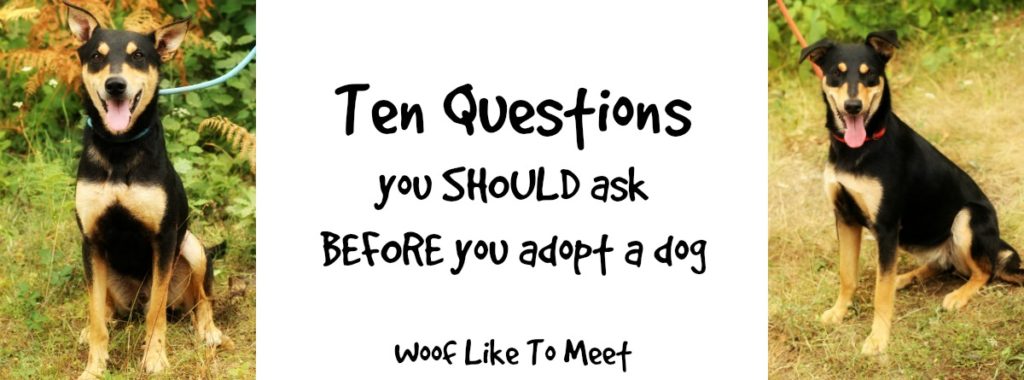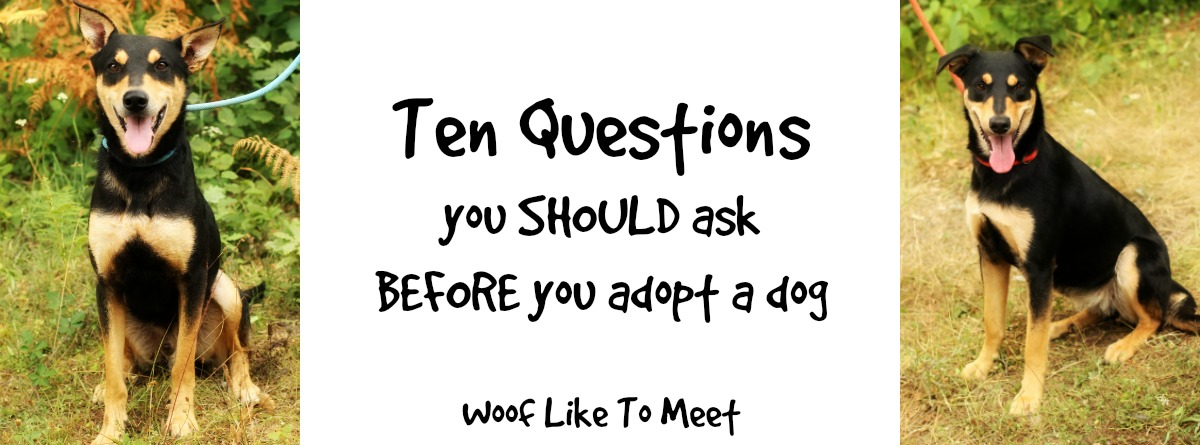
There are plenty of people who do ask the most ridiculous of questions (usually by email!) when a dog catches their eye. Sometimes that’s just because they don’t realise that our dogs are in the shelter, for the most part, not in a home. We have occasional dogs in foster, but by and large, the majority of our dogs are at the refuge itself.
So for that reason, no, I can’t tell you if they are house-trained. In fact, any house-trained dog can have an accident or two in a new home, or even forget altogether that going to the toilet in the house isn’t something they do. Fripouille the poodle I had here had a few accidents. He came from a home where he never had any. He went to a home where he had one or two. If you’d asked before he came here, the answer would have been “Yes!” and it still would have been when he left. That he was too stressed to pee until he was absolutely bursting and didn’t know where to pee is not a lack of house-training.
And whilst we have cats at the refuge, we do not have chickens, ducks, geese, cows or horses. Do you mean that you want to know if the dog has a high prey drive? Their reaction to cats might tell us that, but I simply can’t test your new favourite potential dog to adopt with a guinea pig. In fact, the majority of people who ask for dogs to be tested with a variety of barnyard or circus animals never adopt the dog. I speak from experience. Anyone who wants to know if Féfelle my foster beauceron is okay with cows, chickens and geese… yes he is. It took me a morning to test him with them and without adoption. In fact, Tilly was my serial chicken chaser when she arrived. She did it for five days and then we trained it out of her. Does she have a high prey drive? Yes, where birds are concerned. She’s a spaniel. It’s hard-wired. Often, when people want to know about farmyard animals, it means their property is not adequately secure and that a dog could easily get to them. Let me tell you something. My dog Heston made up a game with his friend César that was called “tug-of-chicken-war” when I left him on his own, despite the fact he had never, ever chased a chicken. Unsupervised dogs who can get to your feathery ones may well make their own fun, so please bear that in mind.
So what should you ask?
- How do they react around people? Are there any people they’re scared of? The shelter is full of people. Some dogs are scared of tall people. Some are scared of men. Some appreciate men more than they do women. Some are shouty with all people they don’t know. Some are shy. Some stand back until they know you. If a dog has been at the centre for more than a couple of days, we’ll be able to tell you how they are with people. Hagrid? Fine with people. A bit full frontal and I wouldn’t trust him with small beings of the human variety, but neither scared nor aggressive. Jasper? Terrified of the small beings. Will hide in a bush. Needs to go to a home where there is minimal contact with small humans. Lexie? Won’t approach you until she knows you and even then, she’s never going to be sitting on your lap within twenty-four hours.
- How do they react around other dogs? Are they okay with males, females, both? Are they playful? Most dogs will have been subject to at least one pairing within ten days of arrival. The staff will be able to tell you if they are easy to introduce or if they are a bit Tarzany. We’ll also be able to tell you if they really shouldn’t be with any other dogs at all.
- How do they react around food? Food guarding or aggression around food is not a great habit, but it’s a habit that is very easy to cure. Still, it’s something you want to know. All dogs who’ve had more than one meal here will have already shown how they are around food. You should definitely ask about food behaviours.
- How do they react around cats? We have a lot of cats at liberty in the refuge, and it’s a situation we come across often. It can tell you instantly about prey drive. I had a small pointer here over Christmas. He saw my non-wiggly, sleepy two-week-old kittens and he went into full point. He was absolutely fixated, even from fifty metres. Whilst food aggression is easy to deal with even in its most severe states, a very high prey drive is not. If you have a dog who is hard-wired to chase small furries, know that your time off lead will be influenced by that, as well as their recall under stress. A secure garden is a must for a dog with a very high prey drive.
- How did they come to the shelter? A dog who has been surrendered may have some historical background. It may or may not be accurate. It shouldn’t surprise you that people will lie in order to surrender a dog who they no longer want. It’s easier to say that the dog has bitten a child than it is to say you don’t want a dog any more. It’s also easier to say that the dog has a gazillion problems when in reality you never walked him and you bought him from some backyard breeder who didn’t care that the parents were crazy. A dog who has come in through the pound also tells you that they may or may not be an escape artist. Sometimes, people will let their dogs out on purpose so they’ll run away. Sometimes, people drive a long way to drop them off and abandon them. Sometimes, people have dogs on properties with no fences and the dogs are strangely often found in the road or neighbours’ gardens. For the most part though, dogs in the pound have escaped or been let out accidentally. I have no doubt at all that Tobby got out somehow. That dog is a seasoned Houdini. I’m pretty sure Amigo ran off after a creature on a hunt and then got lost. A dog who comes in through the pound may tell you a great deal about what kind of fence you need. Add breed to a pound arrival and you’ve got a magic formula for an escapee.
- Have they been treated for anything while they were here? At the Refuge de l’Angoumois, our vet nurse keeps detailed records of who’s had what medicine, if they’ve got food allergies, if they’ve been scratchy, if they’ve been wormed. That’s stuff you need to know. Often, a note will be in their file, but we sometimes forget to check, so ask us about the dog’s medical history.
- How were they with the vet? A vet visit is always going to be a part of a dog’s life. All our dogs are vaccinated and chipped, so they will have been to see the vet at least once. If they’ve had their booster vaccinations and other health checks, that’s probably two or three times, if not more. The staff know who goes in with a skip and a hop, and who needs a sedative before you can wheel them in on a truck. It tells you a great deal that will help you. Nothing worse than having a battle with your dog in the vet car park, or ending up with a dog who bites the vet. We might not always remember, but if there’s something that stood out, we should be able to tell you.
- Do they have any behaviours that you need to know about? We can tell you who destroys bedding, who is barky with strangers, who is scared, who is playful when you get them out, who’d rather take you for a walk, who’s nose to the ground, who’s playful, who gets over-excited, who hates sudden noises. Just ask. We might not tell you if we forget. We might think it’s not relevant or it’s a behaviour that might evaporate out of the stress of the refuge. But if your dog likes to walk around with a ball or a rope toy, we can let you know.
- Do the shelter think this dog is a good match for you? What people want and what’s a good match aren’t always the same. Often, people want a dog that is too high in energy for their situation, or is too young. Don’t think that our business is selling dogs. It isn’t. Our business is finding the right home for the right dog. Shelter staff will be able to tell you if what you want in a dog is a feasible thing and whether or not the dog you are thinking of adopting would suit you.
- What is the best way to integrate this dog when you get home? We can tell you lots about that! How to introduce your dog to another dog… how to introduce them to a cat… how to house-train them if they have forgotten… how to overcome fear… I know a lot of people think that shelter workers are charity first, animal second, but it is not true. They are animal first. They work with animals and have bags of experience.
Once the adoption papers are signed does not mean the relationship is over. If you have problems with your dog and you’re at a loss as to what to do, just ask! You might think the problem you’re having with your new dog is the most bizarre and irrational one ever, but the chances are, it’s perfectly normal doggie behaviour and we can help you find a strategy to channel that behaviour in more positive ways. Once you adopt a dog, that relationship is a lifelong one. We always love to see photos and hear stories. It makes what we do incredibly rewarding. You should also ask questions of yourself too, to make sure that you’re ready for your new family member.

